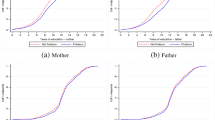Summary
We analyze the completed highest education degree of four ten-year birth cohorts between 1934 and 1973 in Switzerland, using data from the Swiss Household Panel 1999–2004. As expected, the fraction of tertiary graduates has increased over time, for women more so than for men. Educational attainment is highly correlated with educational attainment of parents. We then decompose the overall trend into a parental background effect and a general expansion effect. For women in particular, we find that a substantial fraction of the overall increase in participation in tertiary education can be explained by the fact that the participation rates of women with lowly educated parents have increased. We furthermore explore the role of financial constraints in explaining these trends. Although the number of individuals suffering financial hardship during youth has declined over time, logit models suggest that financial problems might have become more important as an impediment for higher education.
Article PDF
Similar content being viewed by others
References
Angrist, Josh, Victor Lavy and Analia Schlosser (2006), “New Evidence on the Causal Link between the Quantity and Quality of Children”, IZA Discussion Paper No. 2075.
Antonovics, Kate L. and Arthur S. Goldberger (2005), “Does Increasing Women’s Schooling Raise the Schooling of the Next Generation? Comment”, American Economic Review, 95, pp. 1738–1744.
Bauer, Philipp and Regina T. Riphahn (2006a), “Education and its Intergenerational Transmission: Country of Origin-specific Evidence for Natives and Immigrants from Switzerland”, Portuguese Economic Journal 5, pp. 89–110.
Bauer, Philipp and Regina T. Riphahn (2006b), “Timing of School Tracking as a Determinant of Intergenerational Transmission of Education”, Economics Letters 91, pp. 90–97.
Behrman, Jere R. and Mark R. Rosenzweig (2002), “Does Increasing Women’s Schooling Raise the Schooling of the Next Generation?”, American Economic Review, 92, pp. 323–334.
Black, Sandra E., Paul J. Devereux and Kjell G. Salvanes (2005), “Why the Apple Doesn’t Fall Far: Understanding Intergenerational Transmission of Human Capital”, American Economic Review, 95, pp. 437–449.
Cameron, Stephen and James Heckman (2001), “The Dynamics of Educational Attainment for Black, Hispanic, and White Males”, Journal of Political Economy 109, pp. 455–499.
Chevalier, Arnaud and Gauthier Lanot (2002), “The Relative Effect of Family Characteristics and Financial Situation on Educational Achievement”, Education Economics, 10, pp. 165–181.
Dustmann, Christian (2004), “Parental Background, Secondary School Track Choice, and Wages”, Oxford Economic Papers, 56, pp. 209–230.
Ermisch, John and Marco Francesconi (2001), “Family Matters: Impacts of Family Background on Educational Attainments”, Economica, 68, pp. 137–156.
Haveman, Robert and Barbara Wolfe (1995), “The Determinants of Children’s Attainments: A Review of Methods and Findings”, Journal of Economic Literature, 1995, 33, pp. 1829–1878.
Jenkins, Stephen P. and Christian Schluter (2004), “The Effect of Familiy Income During Childhood on Later-Life Attainment: Evidence from Germany”, IZA Discussion Paper No. 604.
Schütz, Gabriela, Heinrich W. Ursprung, and Ludger Woessmann (2004), “Education Policy and Equality of Opportunity”, CESifo Working Paper No. 1518.
Vellacott, Maja C. and Stefan C. Wolter (2004), Equity in the Swiss Education System: Dimensions, Causes and Policy Responses. National Report from Switzerland contributing to the OECD’s review of “Equity in Education”, SKBF, Aarau.
Woessmann, Ludger (2004), “How Equal are Educational Opportunities? Family Background and Student Achievement in Europe and the USA”, CESifo Working Paper No. 1162.
Author information
Authors and Affiliations
Corresponding author
Additional information
We thank two anonymous referees for valuable comments.
Rights and permissions
Open Access This article is distributed under the terms of the Creative Commons Attribution 2.0 International License ( https://creativecommons.org/licenses/by/2.0 ), which permits unrestricted use, distribution, and reproduction in any medium, provided the original work is properly cited.
About this article
Cite this article
Cattaneo, A., Hanslin, S. & Winkelmann, R. The Apple Falls Increasingly Far: Parent-Child Correlation in Schooling and the Growth of Post-Secondary Education in Switzerland. Swiss J Economics Statistics 143, 133–152 (2007). https://doi.org/10.1007/BF03399236
Published:
Issue Date:
DOI: https://doi.org/10.1007/BF03399236




